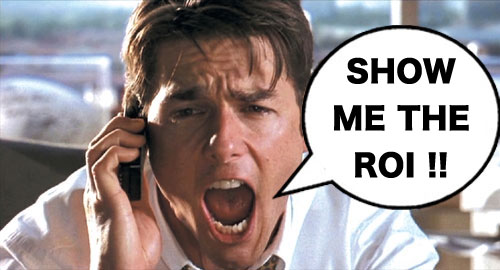New media channels have more to prove.
Many companies believe there still isn’t enough data to prove return on investment (ROI) in digital marketing.
However, according to Nielsen Ad Dynamics, companies in FMCG (Fast Moving Consumer Goods) allocate 60% of media to television even though only 18% of tradition TV campaigns generate a positive ROI (source: Socialnomics).
What does this tell you about how companies make decisions? By habit? Or by effectiveness?
Here are 11 studies that prove the ROI of digital marketing (with the links, brief summary and key findings of what each study proves).
- CADBURY: Cadbury’s “Chocolate Charmer” online advertising campaign provided ROI almost 4X higher than their TV campaign. The chocolate brand ran a cross-media campaign for its Dairy Milk brand, covering TV, online ads and YouTube promoted videos. Despite only investing 7% of its budget in online, the brand saw the sector generate 20% of the sales.
- COMSCORE (KELLOGG): Kellogg uses marketing mix models to assess the effectiveness of the various elements of its marketing mix. Results from two Brand Market Mix Models show an increase in ROI of 5x and 6x for digital advertising since Kellogg began using comScore advertising effectiveness services to improve the delivery of its media plans. As Kellogg adds viewability measurement* to its optimization processes, it is expected that these ROI numbers will increase further.
- DIGITAL CONSORTIUM STUDY: Consortium members who include Procter & Gamble, Unilever, Nestlé, Kraft Foods, Mondelez, Kimberly-Clark Corp. and Kellogg Co. found marketing-mix models undervalued digital ads, Overall, the best models underestimated the ROI of Facebook and Google ads by only 4% and 11%, respectively. The study found ROI from Facebook ads is underestimated by as much as 48% and from Google search ads by as much as 39%.
- DIGITAL DISTRESS (ADOBE): In a survey of 1,000 US marketers, it was found that only 44% of marketing departments say they have a great deal of influence over their organization’s overall business strategy; 40% think their company’s marketing is ineffective; only 34% feel highly proficient in digital marketing but 83% say it is important for marketing to prove the business impact of ROI and 79% say it will be even more important next year.
- ECOMOMETRICS: Microsoft did an Econometrics study of the effectiveness of digital advertising. Econometrics is looking at vast amounts of good quality data, collected over long periods of time to identify and quantify different brand drivers. As for ROI, they found digital outperforms TV, Print, Radio and Outdoor. They also found that, if digital is added to these media channels, it enhances their effectiveness.
- ECONSULTANCY: comScore and Econsultancy show that more than half of digital ads (54%) are never seen by consumers. It’s a colossal waste, and demonstrates the need for brands and marketers to make sure for ROI that ads are viewable. They recommend: 1) Make viewability a top priority, 2) Select ‘on-demand’ ad formats, 3) Native ad formats will be more viewable, 4) Make the creative compelling and 5) Be relevant to the content and the consumer.
- FOURNAISE: In interviews with 1,200 CEO’s, management and marketing decision makers, 90% global marketers are not trained to calculate return on investment (ROI), and 80% struggle with being able to properly demonstrate to their management the business effectiveness of their spending, campaigns and activities.
- GOOGLE AND DOVE: Google and Dove worked together to explore the impact of online advertising on in-store sales. The study found that the inclusion of online advertising resulted in a 6% overall sales uplift. Online advertising was most effective when used in synergy with national TV, a combination that led to a 11% sales uplift. Most interestingly, it was found that although the campaign advertised a single product, it was effective in generating sales over the whole range.
- KANTAR WORDPANEL: Coke’s return on investment from Facebook advertising in France beat its ROI from TV. Every euro spent on Facebook returned 2.74 euros in additional Coke sales. That was 3.6 times better than the ROI attributed to TV ads. In all, 27% of incremental sales Kantar attributed to the campaign came from Facebook, but only 2% of the cost.
- NIELSEN: Consumer packaged goods (CPG) brands can experience a return of almost three dollars in incremental sales for every dollar spent in online advertising that has been precisely delivered using purchase-based information. Nielsen completed more than 800 studies over the past seven years, collaborating with more than 300 CPG brands and 80 companies to measure the correlation between online advertising and offline consumer purchases.
- 166 CASE STUDIES PROVE SOCIAL MEDIA ROI: BarnRaisers has published case studies that prove the ROI of social meidia for B2C and B2B comapnies (large and small) across a broad range of digital marketing channels – Social Media, Social CRM, SEO, Customer Service and Social Promotion. You can download the eBook for free on the sidebar of this website
Do these studies prove the ROI of digital marketing to you? Do they help your company to make decision based on effectiveness, not by habit?





